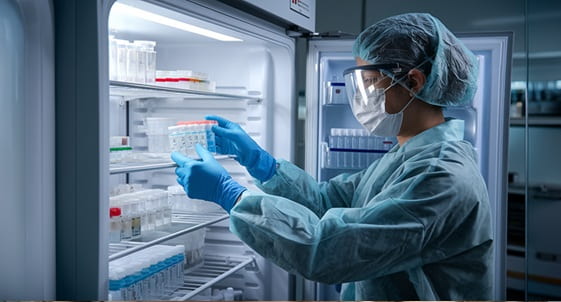In every research laboratory, medical facility, or diagnostic center, there is a need for dependable, temperature-controlled storage. Vaccines, reagents, and other sensitive materials require temperature control — something the run-of-the-mill home fridge can’t offer. That’s why specialist laboratory refrigators are an absolute necessity.
Whether you’re running a small clinic or managing a full-fledged research institution, choosing the right refrigeration equipment is an important part of the process.

What Makes Laboratory Refrigerators Different?
Domestic refrigerators are built for convenience, not control. They have temperature swings, uneven cooling, and often, frost build-up, none of which you want for sensitive biological materials. In a lab setting, even a tiny shift in temperature can mean compromised results or lost samples.
A proper lab-grade refrigerator maintains a tight temperature range, typically between 2°C and 8°C, and does it consistently. You don’t want a dip to 0°C that accidentally freezes your vaccine stock. Or a rise to 10°C that spoils sensitive enzymes. And let’s not forget alarms, monitoring systems and data logging features. These may sound like extras, but in a medical lab, they’re essential.
Why Consistency in Cooling Isn’t Optional?
Life-saving vaccines must be kept within a fixed range throughout their shelf life. If that range is broken, even briefly, the vaccine’s efficacy drops. This could lead to ineffective treatments or worse, delayed health responses. That’s not a risk any healthcare facility can afford.
The 478-litre Laboratory Blue Refrigerator, provided by top manufacturers such as Godrej Enterprises Group, is intended to fulfil the very specific cooling requirements of laboratories, hospitals, clinics, and diagnostic centres. It has hermetically sealed cooling technology and a digital temperature record system that stores data for up to 60 days, facilitating round-the-clock monitoring and easy retrieval for the sake of audits or fault-finding.
Optimising Lab Efficiency: More Than Just Storage
A good lab refrigerator doesn’t just preserve. It improves workflow. When designed well, it reduces the need for manual checks, cuts down time spent revalidating conditions, and supports better planning. For example, a version with a thermal barrier doesn’t just store samples, it helps maintain internal temperatures during power breaks or door openings. This means less stress for lab personnel and fewer disruptions during crucial processes.
In addition, the design is also very important. There are models with thoughtful shelving, modular compartments and easy-clean surfaces. These small things go a long way when your day involves juggling multiple experiments and sample types. You don’t have to fumble around a cramped or fogged-up interior trying to retrieve something mid-process.
Vaccines, Diagnostics and Pharma Labs: A Shared Need
Across the board, from public hospitals to private diagnostic chains, the demand for high-performance lab refrigeration is rising. The pandemic put a massive spotlight on this category. Cold chain failures could mean millions of wasted vaccine doses. Even post-pandemic, vaccine storage remains mission-critical.
Diagnostics labs, meanwhile, deal with everything from RNA samples to blood plasma. A minor compromise in temperature could lead to invalid test results. And with pharma companies pushing into biotech and mRNA-based therapies, the storage stakes are even higher. A growing number of labs are now seeking solutions that combine dependable performance with energy efficiency.
What Makes a Good Lab Refrigerator?
Here’s a quick overview of why laboratory models outperform regular fridges.
- Consistent Cooling: Maintains a 2°C to 8°C range even during door openings or voltage fluctuations.
- Integrated Monitoring: Digital temperature recorders with 60-day logs.
- Custom Fit: Models range from compact 57-litre units to spacious 579-litre versions with multiple adjustable shelves.
- Alarm Systems: Built-in alerts for temperature deviations and door open time.
- Energy-Efficient Tech: Hermetically sealed systems reduce energy loss.
Future-Proofing with Precision
As labs grow more advanced, equipment must keep pace. The focus isn’t just on what laboratory refrigerators can do today, but how it can support evolving needs. For example, more facilities are investing in refrigeration that integrates with lab software, enabling better data management and audit trails. Others seek flexible units that can adapt to changing sample sizes or use cases.
While a reliable temperature is still the primary requirement, energy consumption, ease of maintenance, and space efficiency are starting to matter more. That’s why many modern labs are turning to precision-built refrigerators designed specifically for clinical and research use, not just converted commercial models.
Conclusion
Selecting the right laboratory refrigerator isn’t just about specs. It’s about trust. You need a supplier who understands the stakes and who treats a vaccine or a blood sample as more than just stored material. Suppliers with decades of engineering legacy, backed by a strong quality assurance system, offer more than just cooling; they offer peace of mind.

